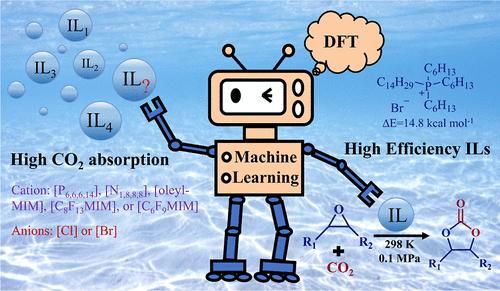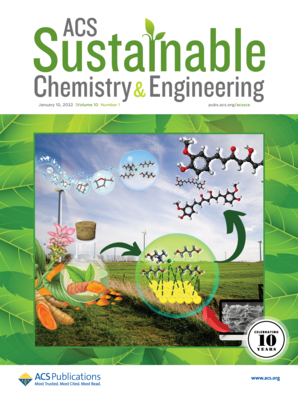Screening of Ionic Liquids for Efficient CO2 Cycloaddition Catalysis under Mild Condition: A Combined Machine Learning and DFT Approach
IF 7.3
1区 化学
Q1 CHEMISTRY, MULTIDISCIPLINARY
引用次数: 0
Abstract
The industrial application of ionic liquid-catalyzed CO2 cycloaddition reactions is impeded by harsh conditions. We propose a novel approach that utilizes machine learning and density functional theory (DFT) to overcome this challenge. By training regression algorithms on a data set of 10,174 experimental data points, we developed a predictive model for CO2 solubility in ionic liquids. The random forest (RF) model exhibited exceptional accuracy, enabling the prediction of the CO2 solubility in 1624 newly generated ionic liquids. Subsequent experimental validation confirmed the efficacy of the RF model. Moreover, employing the RF model and DFT calculation, we identified four ionic liquids with high CO2 solubility and low energy barriers for catalytic reactions, presenting promising candidates for efficient CO2 cycloaddition with epichlorohydrin under mild conditions. This study showcases a streamlined approach to catalyst discovery by integrating machine learning and DFT methods, offering a pathway toward sustainable CO2 utilization.

筛选温和条件下高效 CO2 环加成催化的离子液体:机器学习与 DFT 的结合方法
离子液体催化的 CO2 环加成反应的工业应用受到苛刻条件的阻碍。我们提出了一种利用机器学习和密度泛函理论(DFT)来克服这一难题的新方法。通过在由 10,174 个实验数据点组成的数据集上训练回归算法,我们开发出了离子液体中二氧化碳溶解度的预测模型。随机森林(RF)模型表现出了极高的准确性,能够预测二氧化碳在1624种新生成离子液体中的溶解度。随后的实验验证证实了 RF 模型的有效性。此外,利用射频模型和 DFT 计算,我们确定了四种具有高二氧化碳溶解度和低催化反应能垒的离子液体,为在温和条件下与环氧氯丙烷进行高效的二氧化碳环化反应提供了候选物质。这项研究通过整合机器学习和 DFT 方法,展示了一种简化的催化剂发现方法,为实现二氧化碳的可持续利用提供了一条途径。
本文章由计算机程序翻译,如有差异,请以英文原文为准。
求助全文
约1分钟内获得全文
求助全文
来源期刊

ACS Sustainable Chemistry & Engineering
CHEMISTRY, MULTIDISCIPLINARY-ENGINEERING, CHEMICAL
CiteScore
13.80
自引率
4.80%
发文量
1470
审稿时长
1.7 months
期刊介绍:
ACS Sustainable Chemistry & Engineering is a prestigious weekly peer-reviewed scientific journal published by the American Chemical Society. Dedicated to advancing the principles of green chemistry and green engineering, it covers a wide array of research topics including green chemistry, green engineering, biomass, alternative energy, and life cycle assessment.
The journal welcomes submissions in various formats, including Letters, Articles, Features, and Perspectives (Reviews), that address the challenges of sustainability in the chemical enterprise and contribute to the advancement of sustainable practices. Join us in shaping the future of sustainable chemistry and engineering.
 求助内容:
求助内容: 应助结果提醒方式:
应助结果提醒方式:


